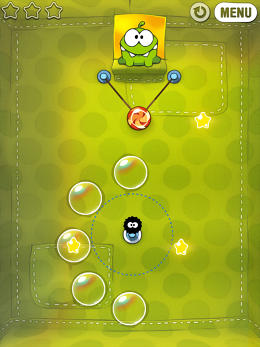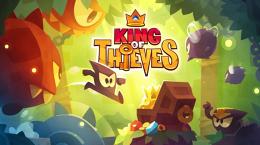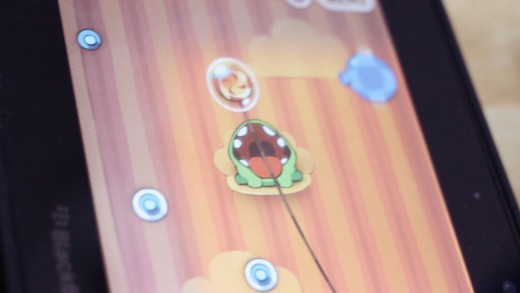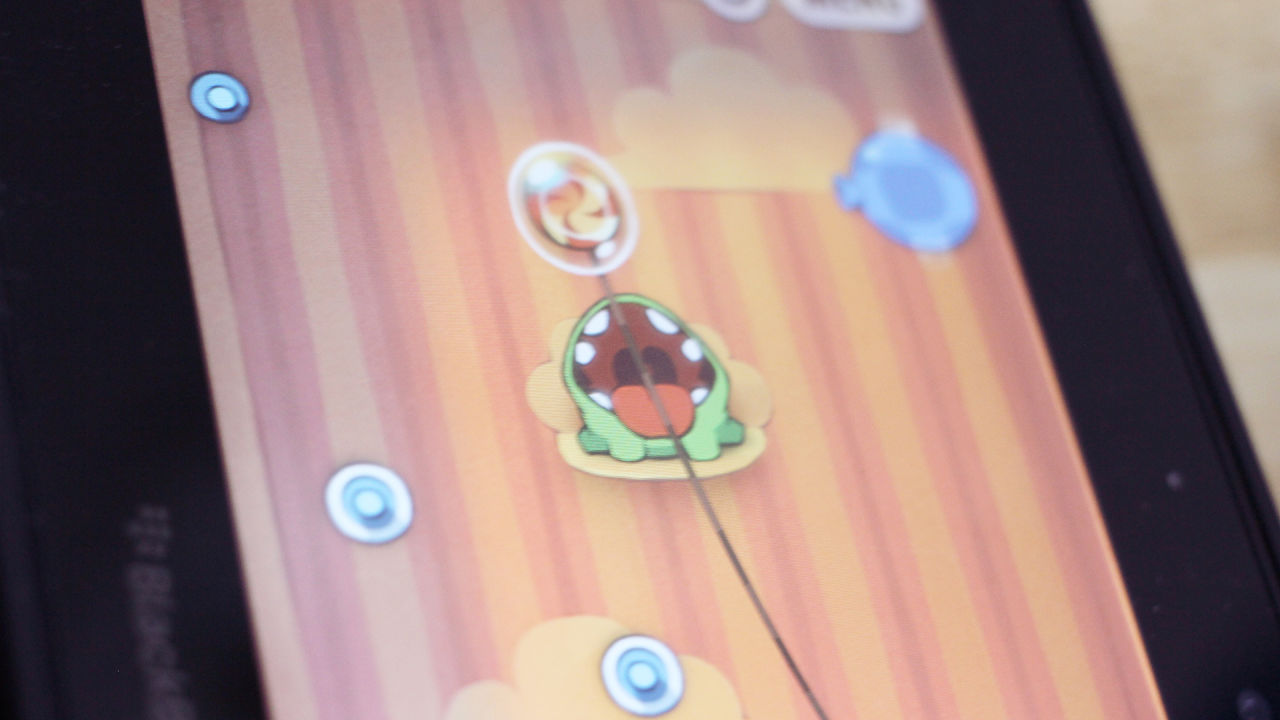Happy Monster: How The Makers of “Cut The Rope” Became The Anti-Rovio
ZeptoLab survives the mobile gaming bubble by making sure its expectations are realistic.
If you played games on a smartphone around the beginning of this decade, it was hard to ignore Cut the Rope.
Like other mobile megahits from the time, Cut the Rope combined a cute character with simple yet satisfying mechanics. In this case, the goal was to feed a tiny green monster named Om Nom by slicing a piece of candy free from increasingly elaborate rope shackles so that it dropped directly into his mouth. Within a year of its October 2010 release, Cut the Rope had racked up more than 50 million downloads, and had dethroned Angry Birds in app store charts.
Based on the high-profile trajectory of Angry Birds maker Rovio, you might guess what happened next: Plush toys, comics, and web videos sprang forth, along with more games, spinoffs, and commercial tie-ins. For mobile’s big money-makers, the next couple of years were heady times.

But unlike its feathered rival, Cut the Rope maker ZeptoLab never flew too high, and therefore hasn’t come crashing down. The Russia-based company currently employs roughly 100 people—one-eighth of what Rovio had at its peak in 2013—and early on decided not to seek funding or entertain acquisitions. While ZeptoLab doesn’t reveal its revenues, the company says that it has remained profitable through the years and avoided mass layoffs. (Rovio, by comparison, laid off 110 employees last year, and 260 more this year.)
“We were able to grow moderately,” says ZeptoLab CEO Misha Lyalin. “We have not overextended our brand, we did not go full speed and say Cut the Rope everything.”
To be clear, the comparisons to Angry Birds are mine, not ZeptoLab’s. In an interview, Lyalin doesn’t bring up Rovio until I ask, and even then declines to say much, except that the two companies have pursued different strategies. And yet, despite those differences, both companies have wound up in similar places.
Just Enough Om Nom
Counting last week’s launch of Cut the Rope: Magic, ZeptoLab has released six Cut the Rope games since twin brothers Efim and Semyon Voinov founded the company five years ago. That sounds like a lot, until you consider that Rovio released 14 Angry Birds games in the same time span, including tie-ins with Star Wars, Transformers, and the 2011 animated film Rio.
ZeptoLab’s release cycle may be slower because it’s a smaller firm, but Lyalin notes that the company could have pushed out more games than it has. “We’ve killed very, very many games with Om Nom before,” Lyalin he says.
The company has also walked away from deals it didn’t like—Lyalin hints at several opportunities for cheap T-shirts or other low-quality merchandise—and has washed its hands of ideas that didn’t work.
One example: In late 2011, ZeptoLab released a comic book series that revealed Om Nom’s backstory. Lyalin now says the company wasn’t happy with the product, which is why ZeptoLab has since removed all traces of it from the App Store.
“It told the story of Om Nom, and we kind of understood that we weren’t ready to do that,” Lyalin says.
ZeptoLab now thinks it’s found a better way. The company has been producing short videos, which are available on YouTube and also integrated into the latest Cut the Rope games. So far, they’ve been collectively viewed 2.5 billion times, including 500 million views on YouTube. ZeptoLab has also partnered with Blockade Entertainment to produce an Om Nom feature film by 2020. (The film was originally slated for next year, but has since been pushed back due to production delays.)
Rovio, meanwhile, has been planning an Angry Birds movie since 2013, with a scheduled release next spring. As Fortune has noted, the $80 million film appears to a crucial part of Rovio’s turnaround strategy as profits have fallen and sales have flattened.
By comparison, ZeptoLab’s animation push seems like less of a leap. While Lyalin expects animation to become a “big, big part of the business,” he doesn’t think it’ll dominate over the company’s gaming efforts. “We think of our business as games being the biggest driver,” he says. “Everything else is great, but it’s very different markets, and we’re certainly a gaming company.”

A More Balanced Diet
The problem for many explosive mobile gaming companies is that they have trouble escaping the shadow of their biggest hits. It’s something ZeptoLab has been trying to deal with for years.
“When we started the company, we always wanted to do new and innovative games, and never wanted to be just a Cut the Rope or Om Nom company,” Lyalin says.
The company might finally be getting somewhere with King of Thieves, a platforming game in which other players can design and booby-trap the levels. As with ZeptoLab’s Cut the Rope games, many ideas died so that King of Thieves could live.
“We started this process a while ago, by which we tested, tested, tested, and started many projects, and killed many of them in order to ship King of Thieves,” Lyalin says.
The free-to-play game has seen 20 million downloads without much marketing on ZeptoLab’s part. (Lyalin mentions a massive advertising campaign that was pulled at the last minute, as ZeptoLab observed other gaming companies not getting a return on similar investments.)

What’s more rewarding, though, is that people seem to be recognizing ZeptoLab as the game’s developer. At least anecdotally, Lyalin has observed player reviews that mention the company by name. He’s thrilled, even when those comments are along the lines of “ZeptoLab sucks.”
“The emotions were really great, and how many people mentioned ZeptoLab, I was really surprised about,” he says. “That tells me that our approach to branding and releasing quality, innovative games really works.”
Beyond building completely separate franchises, ZeptoLab isn’t above raiding the candy store for new ideas. Part of the company’s expansion plan involves using Cut the Rope’s animated shorts and core games to introduce new characters, who might eventually star in their own games.
“Now Om Nom, as a character, will get a story, and the story will give us more opportunity to build different games and experiences around the character, and his friends, and where he came from,” Lyalin says.
All of these efforts do require some level of expansion, and so earlier this year, the company opened a satellite office in Barcelona, aimed at recruiting talent that doesn’t want to relocate to Moscow. (On April Fool’s Day, the company joked about building a King of Thieves theme park there, which certainly seems like a nod to Rovio’s amusement park efforts.)
ZeptoLab’s biggest challenge, Lyalin says, will be to remain diligent and stay true to its goals of making innovative games as the company’s ambitions grow. It would sound cliché if there weren’t a strong precedent for mobile game companies losing their focus.
“Companies die from suicide, not homicide,” Lyalin says. “So the challenge is always inside the company.”
Fast Company , Read Full Story
(105)














